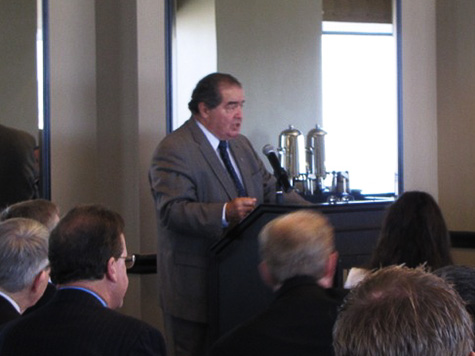SAN DIEGO, California — “What is the source of our liberties?” United States Supreme Court Justice Antonin Scalia asked a room brimming with lawyers. Thursday morning’s Federalist Society event in San Diego featured the controversial jurist, who stressed how distinctive the U.S. Constitution is from others throughout the world.
It is not simply the Bill of Rights that provides our liberties, Justice Scalia argued. Many other countries establish a Bill of Rights. The difference is that the U.S. enforces the rights it purports to provide, while foreign governments are often careful to preserve a centralized system of power.
“Most Americans don’t realize how different our Constitution is from the rest of the world,” he emphasized.
Scalia spoke of citizen complaints surrounding the gridlock our system experiences; however, Scalia said, the “Framers would have said yes! It is designed for gridlock.” This design, he said, is intended to let only “really good legislation” get through.
President Ronald Reagan appointed Antonin Scalia to the Supreme Court in 1986. He filled a position vacated by Justice William Rehnquist, who was appointed Chief Justice.
While public attention often focuses on the power of the U.S. Supreme Court, Scalia asked the audience what the most important court in their lives and the lives of their families is. His answer: the state supreme court. Scalia remarked that even murder can be committed without committing any federal crime and that standard crimes are state crimes.
Justice Scalia then went on to speak of recent moves to shorten law school to two years from three. Suggesting “to shorten is ridiculous,” he added that “most law schools do not believe there is any core” to the law. He emphasized, “being a lawyer means being learned in the law.”
According to Scalia, electives have begun taking over in law schools today, forsaking the core of law. One of the classes now offered as Harvard Law, he noted, is titled, “The Philisophocal Reinvention of Christianity.” Another school offers “Large Law Firms” as a class. He then revealed that at Georgetown, for first year law students all core law courses are completely optional. “I think law schools are in bad shape,” he said.
When time was opened up for Justice Scalia to take questions, one audience member asked for his thoughts on opening up undergraduate majors in law. Scalia was adamant that not everyone needs to go to college in the first place. He focused on remembering when it was once very honorable to be a tradesman, and to work with one’s hands like plumbers and electricians, “I don’t know why we denigrate that.”
When asked about whether the president should be using military force without a declaration of war, Scalia replied that it’s “not as easy a question as you might think.” He commented that even President Jefferson committed troops to foreign regions.
Commenting on federal versus state regulation of marijuana, Scalia stated that when federal and state law conflict, federal law prevails. It is then up to federal agents to enforce those federal laws and their lack of enforcement is one of the problems. A second problem, he stated, is legislative officials disregarding federal law.
When asked what his greatest concern is about the Supreme Court going forward and after he is gone, Justice Scalia quickly commented that he is not concerned with his legacy. “My concern, it’s gotten much more polarized from when I started,” Scalia remarked, “Things have gotten really bad, beginning with Bob Bork.”
He said, “Once upon a time, everybody was an originalist.” He recalled a time when nobody would say, “in light of current conditions,” inferring that the Constitution has changed.
When asked about the political aspect of the court, Scalia said it’s very rare that politics don’t play a part in Supreme Court appointments. “Republicans very rarely appoint a Democrat and when they do, they regret it.”
As a fan of the opera, Justice Scalia was also asked his favorite opera, which he named La Traviata and Rosenkavalier along with his favorite composer, Puccini.
The final question to the Justice on the 13th anniversary of the 9/11 terror attacks was: Where was he on September 11, 2001?
He said he would never forget where he was. He had just arrived in Rome and was unpacking his luggage. Justice Scalia is from New York and remarked that many of the first responders were graduates of his high school. He emphasized the great privilege we have with public officials in the U.S.–one not shared by public officials in many foreign countries–to invoke reference to God.
The Thursday morning event was hosted by The San Diego Lawyers Chapter of The Federalist Society for Law & Public Policy Studies.
Follow Michelle Moons on Twitter @MichelleDiana

COMMENTS
Please let us know if you're having issues with commenting.